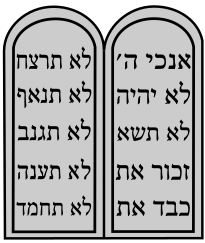So I’ve been rethinking the “ten commandments” (or, better, according to the Hebrew the “decalogue” or “ten words” עֲשֶׂ֖רֶת הַדְּבָרִֽים). There is often discussion in our western context that suggests that the Decalogue belongs in the public sphere (just think of all the legal debates about public buildings and grounds displaying the commandments). Further, they are regarded as universally true and, thus, considered to belong in the public sphere.
My contention is that they are neither universally apparent, nor do they belong to the public sphere. Now before anyone grabs stones to start throwing in my general direction, let me explain what I mean. The Decalogue (just as all of the commandments of the Torah or Pentateuch) belongs, first and foremost, to Israel as a people whom YHWH covenantally created and established. Secondarily, as those who profess faith in Christ, the Church (being grafted into Israel), is that people created and established by the God of Israel to be His people and for Him to be their God…indeed the God of all the nations. The Decalogue, therefore, belongs to a particular covenantal relationship and not simply to some universal truths or principles (just think of Sabbath, YHWH as the only God). This is not to suggest that the command to not murder should be a universally practice, but that in the context of the ten commandments it belongs to the nature of living as the people of the God who created heaven and earth and being made in His image and being in covenant with him.
Jay Marshall argues that a “first step toward discovering the contemporary relevance of the Decalogue…requires a recovery of covenant and community as central concepts of the church” (“Decalogue” pp.171-182 in DOT: Pent., [eds. T. Desmond Alexander and David W. Baker; Downers Grove, IL: IVP, 2003], 181). The Decalogue cannot nor should it ever be diminished to a set of ten principles. It is the testimony of the Only God to redeem for Himself a people by His own Son who would live according to His Spirit.
Related articles
- Lawsuit asks to remove school’s Ten Commandments (foxnews.com)

